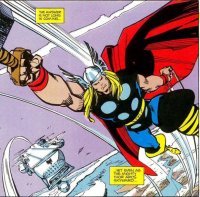- Posts: 3613
- Thank you received: 2803
Bugs: Recent Topics Paging, Uploading Images & Preview (11 Dec 2020)
Recent Topics paging, uploading images and preview bugs require a patch which has not yet been released.
Combat System Simplicity vs. Elaboration
I like the idea of "If X unit is present, get to do Y," but the combination of dealing with cards and dice (with special symbols, nonetheless) is cumbersome.
Please Log in or Create an account to join the conversation.
Please Log in or Create an account to join the conversation.
Please Log in or Create an account to join the conversation.
- Sagrilarus
-

- Offline
- D20
-

- Pull the Goalie
- Posts: 8739
- Thank you received: 7353
Josh Look wrote: . . . but I think it's difficult to design a fun combat system when it's just one system in a game with many others.
Especially when dice are so out of favor these days. I haven't played the games you're all speaking to but as the conversation has progressed my mind has flipped from game to game and where I think combat works. The split dovetails perfectly with Josh's observation in the sentence above. This may belong in the "Profound statements spoken on TWBG" short-list.
Nexus Ops was the critter that my brain stranded in the middle, and it certainly "features" combat even if it isn't the only function on the table. Again, dice firmly in play puts some scare into any decision you make and that keeps it interesting. Simple enough, there's unit ordering that doesn't hinder execution very much but adds a lot of complication to the Go/No-Go decision.
Please Log in or Create an account to join the conversation.
- Jackwraith
-

- Away
- Ninja
-

- Maim! Kill! Burn!
- Posts: 4373
- Thank you received: 5701
Msample wrote: The first and only time I played Forbidden Stars, the combat took some getting used to. We had one instance where after the dust settled....neither side took any casualties IIRC and just returned back to their start points. That felt like an unintended outcome. Like the combat system in base STAR WARS REBELLION, it allows shield results to neutralize hits. While perhaps thematic, from a pure mechanic standpoint it only serves to prolong both the individual combat as well as the overall game.
I think that, as Charlie pointed out, it's something of a mini-game unto itself, so the inclusion of shields neutralizing hits is an essential part of that mini-game, in that you play certain cards in anticipation of what your opponent is going to do in order to intentionally prolong the combat. I think it's a really cool system, as well, but it does add a lot of mental weight to an area control game that's already pretty heavy, with the variety of powers/units for the factions, stacking orders, positioning warp storms, etc. It can be pretty taxing and then the combat is an additional layer of strategy that can feel excessive.
But your simple frustration is understandable, too, since a similar feeling can crop up in much simpler games using the same system, like Funkoverse, where shields perform exactly the same function and can lead to some frustration on the part of the attacking (challenging) player who thought they had a perfect sequence set up, only for the dice to deny it. In that respect, one can say that at least there are cards to buffer the odds of what the dice do in Forbidden Stars, but it often doesn't feel like much of a palliative at those crucial points. You always remember the bad beats more than the good days.
Please Log in or Create an account to join the conversation.
Additionally, the shields provide another variable for faction differentiation. It's a useful mechanism because it allows for hardy Space Marines to feel like the tough SOBs they should. There are also subtle ways the defensive play interacts with advancements and holding positions (something that's terribly difficult in the game, as well as in StarCraft).
It does have its costs, but I find Forbidden Stars has a pretty uptempo pace, mostly because it's a race to acquire your objectives as opposed to hold VP generating spaces.
Please Log in or Create an account to join the conversation.
- Posts: 3613
- Thank you received: 2803
Sagrilarus wrote:
Josh Look wrote: . . . but I think it's difficult to design a fun combat system when it's just one system in a game with many others.
Especially when dice are so out of favor these days. I haven't played the games you're all speaking to but as the conversation has progressed my mind has flipped from game to game and where I think combat works. The split dovetails perfectly with Josh's observation in the sentence above. This may belong in the "Profound statements spoken on TWBG" short-list.
Nexus Ops was the critter that my brain stranded in the middle, and it certainly "features" combat even if it isn't the only function on the table. Again, dice firmly in play puts some scare into any decision you make and that keeps it interesting. Simple enough, there's unit ordering that doesn't hinder execution very much but adds a lot of complication to the Go/No-Go decision.
I think that even with a die roll, there are some other factors to consider when determining if things can't be better. The rate at which troops are removed, does combat definitively resolve at the end of a round or can a space be contested, even the length of the game and how that affects personal investment. It all matters and, when everything really clicks, makes for a situation where a die roll is perfectly fine.
I mentioned Cyclades, and the more I think about it, the more I really do admire it in its simplicity while still having the ability to create thrilling, dramatic combats. That 0-3 on the die is so subtlety smart, as it often creates a situation where I player goes in with a larger force, sure they're going to win, but rolls a 0 on their first roll, losing a troop as a result. Given the average sizes of armies in the game, that one roll can really even the odds. Combat has to resolve by the end of the round, so this creates a simple push your luck decision. Players might be rolling dice for a few rounds, but it's fast enough that nobody is going to be getting anxious for their turn. It really is kind of a perfect, simple combat system. Then you have something like TI, which I love dearly, but you will never hear me say that the combat is fun.
TL;DR: It's ok to roll dice, buy when given the right finesse, it can be AWESOME to roll dice.
Please Log in or Create an account to join the conversation.
- san il defanso
-

- Offline
- D10
-

- ENDUT! HOCH HECH!
- Posts: 4623
- Thank you received: 3560
Please Log in or Create an account to join the conversation.
Please Log in or Create an account to join the conversation.
Absolutely agree with Root as a shining example.
I think one of the best is Clockwork Wars. It's deterministic (if you have six units and I have four, you're simply left with two after combat). What Clockwork Wars does so well is utilize simultaneous hidden movement. So the risk and tension is completely around predicting movements and choosing carefully where to push. The reveal and everyone completing their moves is absolutely thrilling once your lines collide.
Other elements in the game feed into this, such as severing supply lines, special asymmetrical units, and surprise cards which can radically shift the balance.
Please Log in or Create an account to join the conversation.
Please Log in or Create an account to join the conversation.
- hotseatgames
-

- Away
- D12
-

- Posts: 7179
- Thank you received: 6299
Cry Havoc
Dune
Lords of Hellas
It is perhaps telling that none of these feature dice. My favorite dice combats are usually simple...
Nexus Ops
Cthulhu Wars
Please Log in or Create an account to join the conversation.
- Michael Barnes
-

- Offline
- Mountebank
-

- HYPOCRITE
- Posts: 16929
- Thank you received: 10375
I do not like combat “mini games” and in fact I think they ruin a lot of designs. I do not like multiphasic combat resolution- it should be a single process without subroutines. Unlike for everything on the line to be up front and resolved in one pass.
Dice are great, exploding dice even better. But maybe the best dice combat was in that obscure Korean game Lineage II. You attacked with a pile of units and then both sides roll a D8. Higher wins, but loses units based on the difference beteeen the dice. It’s wild and unpredictable, but it accounts for hard-won victories, total routs, and underdog wins.
Civilization is also pretty great- 1:1 losses until only one army is left. It’s as easy as can be. Does not require custom dice, action card play, shield tokens or anything else.
I like skullls v shields too.
So yeah, team simple Stan here.
Please Log in or Create an account to join the conversation.
- Sagrilarus
-

- Offline
- D20
-

- Pull the Goalie
- Posts: 8739
- Thank you received: 7353
hotseatgames wrote: I am fond of games in which you already largely know what you are putting on the line. Ones that come to mind:
Cry Havoc
Dune
Lords of Hellas
It is perhaps telling that none of these feature dice. My favorite dice combats are usually simple...
Nexus Ops
Cthulhu Wars
I think Dune works because it's such a minor part of the game. All of combat boils out to a head count, but since it's part of the falling action it just doesn't matter that much.
Bigger direct conflict games, even simpler ones like Memoir or Tide of Iron get a huge benefit from the variability of unit capabilities, and, as I've been railing about for years, favored ground. I greatly prefer games where the map actually makes a difference even when it's in extreme abstract.
It doesn't even need to be a map. I wrote an article on favored ground about No Thanks, a simple card game where different players come to into contention each turn in different enough states that it plays a critical role in action.
So all these games coming out with "variable player powers" that everyone wants to crow about seem really rigid to me, because in games with a varied contextual underlayment that variability is ever-changing, and you get an opportunity to influence it.
(I'd like an appropriate amount of credit, and disdain, for working "varied contextual underlayment" into my response. That is some serious hoity-toity chinbeard-stroking bullshit right there.)
Please Log in or Create an account to join the conversation.
Please Log in or Create an account to join the conversation.
 Games
Games














 How to resolve AdBlock issue?
How to resolve AdBlock issue?